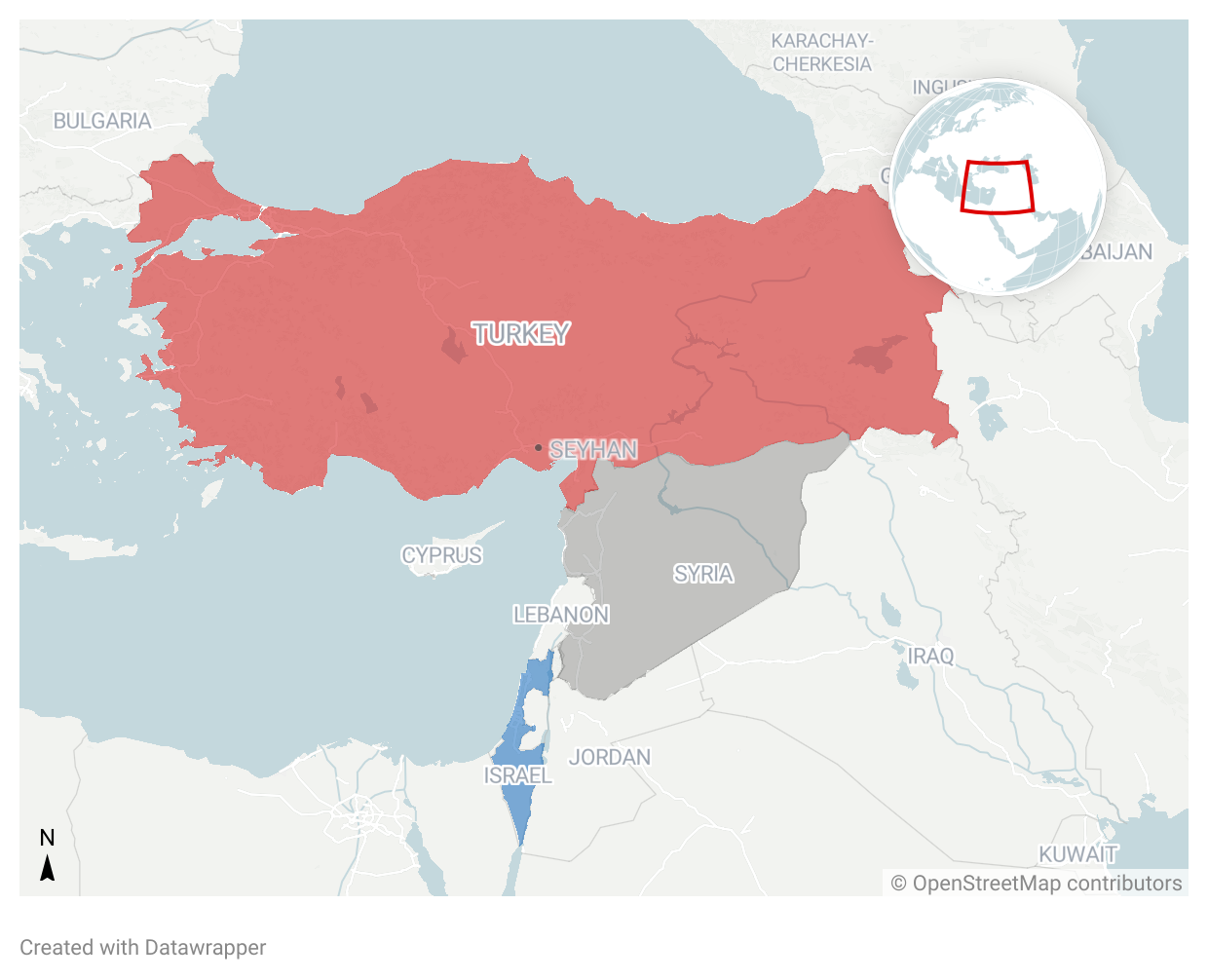Israeli-Turkish Tensions Escalate Over Syria
Thomas Graham | 28 April 2025
Summary
The collapse of the Assad regime and the rise of Syrian President Ahmed al-Sharaa triggered a new phase of geopolitical competition in Syria, with Israel and Turkey engaging in overlapping military operations aimed at securing influence and advancing strategic goals.
Both nations have clashed over territorial presence in Syria, with Israel focused on countering Iranian proxies and Turkey aiming to control northern territories to neutralise Kurdish forces and manage cross-border instability.
Syria now exemplifies a fragmented, contested space shaped by declining U.S. and Russian engagement and rising middle-power rivalry. Although immediate escalation is unlikely, continued Israeli strikes and Turkish entrenchment may fuel diplomatic tensions amid broader regional realignments.
Syrian President Ahmed al-Sharaa, who only months ago led the insurgency which toppled the Assad government, faces significant challenges in maintaining domestic stability and internal cohesion. Already preoccupied with conflict between Alawite minority pro-Assad loyalists in Latakia, the latest of these has emerged as a result of Turkish and Israeli military operations within the country, seeking to carve out zones of influence to advance their respective geopolitical goals. In this setting, tensions between Ankara and Tel Aviv escalated in early April 2025 over reciprocal accusations of expansionism within Syria.
Israeli Interests in Syria
For Israel, the Syrian theatre remains a central pillar of its broader regional security strategy. While the fall of the Assad regime has removed a longstanding adversary, it has also introduced a new phase of strategic uncertainty. Israel’s overriding concern is the presence of Iranian-backed militias and Hezbollah elements that have entrenched themselves across southern and central Syria during the civil conflict. Despite the change in Damascus, Tel Aviv views any successor government — including al-Sharaa's — with caution, wary of the enduring Iranian influence that may persist through proxy actors.
To mitigate these risks, Israel has accelerated its aerial campaign across Syria, targeting arms convoys, suspected IRGC positions, and logistics routes between Damascus and the Lebanese border. The recent operations into Syrian territory mark an evolution in this policy — a shift from punitive strikes to a more permanent form of influence-building. Tel Aviv now appears to be shaping a buffer zone stretching from the Golan Heights into southwestern Syria, echoing similar Israeli postures seen during the Lebanese civil war in the 1980s. This move not only enhances Israel’s strategic depth but also sends a clear signal to Tehran: Israeli red lines in Syria remain non-negotiable, regardless of political transitions in Damascus.
Turkish Interests in Syria
For Ankara, the post-Assad environment presents both opportunity and risk. Turkey’s involvement in northern Syria has long been framed around counterterrorism, particularly targeting the YPG — a group it links to the Kurdish PKK insurgency at home. However, President Erdoğan's government has also leveraged the Syrian conflict to expand Turkish soft power and establish a lasting military and political presence along its southern border. The emergence of President al-Sharaa, a former rebel commander, has added complexity to Turkish calculations. While Ankara initially welcomed the end of Assad’s rule, relations with the new leadership have cooled amid disputes over border control, displaced persons, and Ankara’s insistence on maintaining its “security corridor” in northern Syria.
Turkish forces, supported by allied Syrian militias, have pushed deeper into Idlib and Aleppo provinces since February 2025, establishing new checkpoints and governance structures in an effort to lock in influence before any long-term political settlement is brokered. Turkey’s recent moves have drawn criticism not only from Damascus but from Israel, which views the Turkish push as a challenge to its own strategic objectives. These parallel and often conflicting interventions — both justified on national security grounds — have brought Ankara and Tel Aviv into a rare moment of direct friction.
Regional Context
At the heart of the Israeli-Turkish dispute lies a broader truth: Syria’s fragmentation has become an open arena for competing regional visions. With Washington scaling back its direct involvement and Russia distracted by its own internal and external constraints, the Middle East’s regional powers have moved into the vacuum, each seeking to redraw the map according to their own strategic imperatives. For Israel, this means defending its borders and pushing back Iranian influence. For Turkey, it means shaping a buffer zone that neutralises Kurdish aspirations and projects Turkish strength into the Arab world. And for President al-Sharaa, it means navigating between these external pressures while attempting to stabilise a country exhausted by over a decade of war.
Whether these interests can be reconciled — or whether they will calcify into new lines of confrontation — will define Syria’s next chapter. Initially, it appears that Israel and Turkey have backed down and engaged in diplomatic talks to redraw a deconfliction line to prevent conflict in the country. Albeit, this makes it unlikely that the matter is resolved, especially as Ankara and Damascus are expected to pursue closer defence and military ties which may be perceived as threatening by Israel. What remains clear is that the country is no longer merely a battleground of proxies, but a core testing ground for the ambitions of the region’s most assertive states and a live example of an increasingly multipolarised world.
Forecast
Short-term (Now - 3 months)
Both Israel and Turkey are unlikely to further escalate their row over Syrian influence due to pre-existing domestic and geopolitical concerns.
Medium-term (3-12 months)
The scope of Israeli operations within Syria will almost certainly be guided by its perceptions of national security.
Attempts by Tehran to militarily resupply its proxy Hezbollah, in Lebanon, through Syria will be met with aerial force.
There is a realistic possibility that Tel Aviv may continue to bomb Syrian weapons depots, fearing that these may be used against it in future. Only security guarantees provided by the al-Sharaa government will displace these concerns.
Long-term (>1 year)
Full-scale conflict between Israel and Turkey is unlikely due to the strong geopolitical ties of these nations with the United States.


